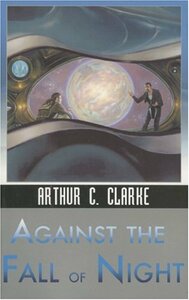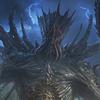Take a photo of a barcode or cover
I've learned a lot about writing, voice, and POV lately, and the only reason I don't give this story 5 stars is because of the sort-of scientific detachment Clarke's writing style seems to have. I think that it's par for the course though compared to other sci-fi writers of that time. I felt a bit distanced from story even though it was a fantastic story. Since the main character, Alvin, is a boy, it would be really interesting to see this re-written as a YA novel!
Anyway, if you love classic sci-fi, this one's for you.
However, The City and the Stars excels with its more in-depth description of the inner-workings of Diaspar. I’d suggest reading Against the Fall of Night then, just the first half of The City and the Stars.
As we get to December I begin to feel, once again, the now yearly desire to read old Arthur C Clarke. It has, without prior planning, become a tradition here to read something of his around his birthday (December 16th). Last year it was The Hammer of God, one of his last novels. This year I’ve gone for an older work – Against the Fall of Night was his first novel, first published as a story in 1948.
There is a complicated history. The version I am reviewing is the one where the novella of 1948 was first expanded into a novel and published in 1953. It was a work Arthur would keep coming back to, however. It is probably worth pointing out that the book was revised again into a novel called The City and the Stars in 1956, and this is the longest and probably the best-known version today.
However, this 1948 edition is the version I first read. When I first found this, about 40 years ago, I was immediately impressed. I was just beginning to read Science Fiction and was grabbing any Clarke I could get my hands on. However, with the passage of time, all that I remember of it now is the vast length of time the book covers, as it is set thousands of years in Earth’s future, and the fact that it was sad. The shorter novella version I read as one of The Collected Stories, and (again, from what I can remember) that elegiac mood seemed strong there as well.
Nevertheless, I have girded my literary loins and dived in.
The plot is a simple one.
Diaspar is a city on Earth, but a planet not thousands but thousands of millions of years in the future from now. It is the last remaining city on the planet, so the residents believe, and is surrounded by encroaching desert. Alvin is a young man who lives there and yearns to discover what the world was once like and explore.
With his friend Rorden, who is the Keeper of the Records, Alvin’s explorations lead him to find an underground transport system that links Diaspar to the city of Lys. Lys has been aware of Diaspar’s existence, but has wanted no connection to it for thousands of years. With his new friend Theon, Alvin meets an old man who is looked after by three strange robots. Alvin attempts to discover the mysterious background of the robot, as it seems that they date back to the time millions of centuries ago of The Invaders. The old man tells of being the follower of ‘The Master’, a person who arrived on Earth after the invasion.
Alvin persuades the old man to allow him to have control over a robot, and despite the protestations of the governors of Lys, returns to Disapar with the robot in tow. When Alvin is summoned to the Council of Diaspar and tell them what he has discovered, he is treated with suspicion and the offer of meeting with the government of Lys declined. In frustration Alvin leaves.
He discovers a spaceship that seems to have belonged to the Master, and with the aid of a robot originally assigned to it, uses the ship to go back to Lys and pick up Theon.
Alvin and Theon decide to leave Earth in the spaceship to discover the origin of the Master. From there, they meet an alien named Valamonde, whose biggest revelation is that the history the people of Diaspar and Lys knew is not the real version of events. The origin of the Invaders is revealed, as too the purpose of Valamonde.
What strikes me most strongly on reading this is that I had forgotten how many of Clarke’s ideas and themes in his later work are present here. First of all, there is the enormous sense of time, that the story takes place over, a huge sweep of past events and forgotten history. Clarke is perhaps paying homage to his hero Olaf Stapledon here, who also covered hundreds of years in mere paragraphs in his book First & Last Men. This creates a sense of history but also of grandeur, of empires risen and fallen.
Secondly, I love the lyrical prose used to illustrate this – some would say cliched or at best overworked, but there is a certain poignancy that still evokes awe in me. Here’s an example from the first chapter:
He thought once more of the desert lapping round the island that was Diaspar, and his mind returned to the world that Earth had been. He saw again the endless leagues of blue water, greater than the land itself, rolling their waves against golden shores. His ears were still ringing with the boom of breakers stilled these thousand million years. And he remembered the forests and prairies, and the strange beasts that had once shared the world with Man.
All this was gone. Of the oceans, nothing remained but the grey deserts of salt, the winding sheets of Earth. Salt and sand, from Pole to Pole, with only the lights of Diaspar burning in the wilderness that must one day overwhelm them.
And these were the least of the things that Man had lost, for above the desolation the forgotten stars were shining still.
Overall, there is a need to explore and a constant need to search – for knowledge, for truth, for answers to the unknown. When there are revelations, it is also telling that the way forward is shown by the disenchanted youths of Diaspar and Lys, rather than by the staid actions of their guides and mentors. The future is for the young, willing to take a risk and go forward rather than the more cautious, set-in-their-ways old folk.
In terms of the bigger picture, there’s also the idea of mysterious aliens guiding our destiny, with things beyond our character’s understanding, but at the same time also the unlimited potential of discovered ideas and realms. Like in 2001: A Space Odyssey, we are not alone, and with their help the future is for us to discover. Far from being sad, the story ends on an cautiously optimistic note.
I was also reminded of Isaac Asimov’s Foundation series here, with the ideas of secret societies, one with telepathic powers, the other not, following similar roles in the same way that Foundation and the Second Foundation worked.
So: does this version of the story stand up? Yes. Compared with the longer novel, this is simpler, tighter and perhaps more direct than the expanded rewritten version*. It is not without faults, admittedly, and I can see that younger readers may wonder what the fuss is about and be unimpressed by the unsophisticated writing style and linear plot. But, whilst it is undeniable that the story reads like a typical boy’s adventure story – there’s little room here for female characters, other than Theon’s diplomatic mother – there’s an engaging energy and enthusiasm that is infectious. Clarke was often bemused and a little exasperated that the earlier version was still read and liked after he significantly rewrote it as The City and the Stars, but its proto-Clarkean thoughts still hold in this version.
Whilst I like the bigger version of The City and the Stars, which gives more space to Clarke’s great big ideas, there’s a simplistic charm here. The story does not outstay its welcome, gets its point across without fuss and leaves an impression that this was at the time a young author with potential. It is also not sad, as I remembered it to be (although there are elements, admittedly), but positive in its outcome, which echoes the optimism no doubt felt at the original time of publication. I liked it.
The book would be in the Juvenile Section under today's rules - the main character is a youth. And the story is about his coming of age. But no publisher would touch it because (1) has very little action, (2) has disjointed jumps in time forward, (3) had no real beginning or end. Also the book is not happy, but melancholy.
The science is based on the science then - when the Galaxy and Universe were the same thing. And the time frame of millions of years don't make much sense under today's evolutionary theories.
Some books should be saved for future generation - to give understanding how people thought and what they knew - especially if the story is good. This is not one of them.









